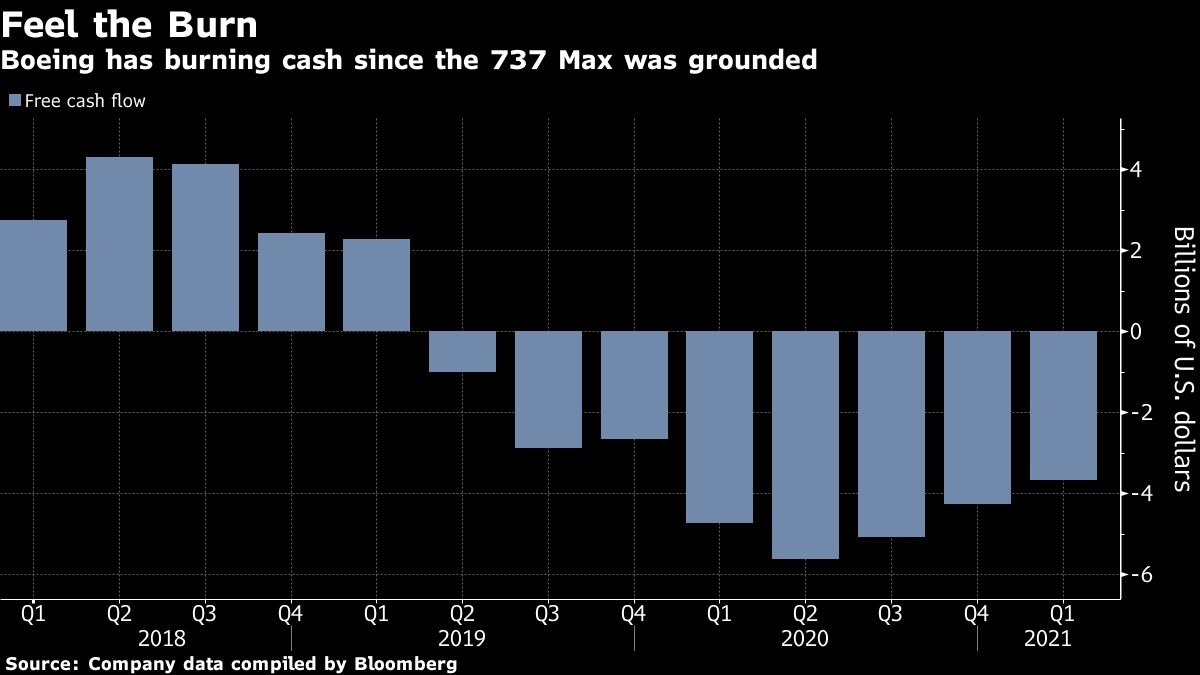Apr 28, 2021
Boeing burns more cash on 787 delivery halt, Max restitution
, Bloomberg News
Notable Calls: Boeing, Apple and Stelco Holdings
Boeing Co.’s cash burn was worse than expected as tumbling 787 Dreamliner deliveries and diminished 737 Max profits signaled that the planemaker still faces a grinding recovery from the coronavirus pandemic and the longest jetliner grounding in U.S. history.
Free cash outlays totaled US$3.68 billion during the first quarter, Boeing said in a statement Wednesday. That was worse than the US$3.34 billion burn predicted by Wall Street. Boeing also posted a deeper-than-expected net loss and recorded a US$318 million charge stemming in part from a supplier spat on its contract to build new Air Force One jets.

The shaky performance underscored the challenges ahead as Boeing battles through one of the toughest stretches in its century-long history. While the planemaker is ramping up deliveries of hundreds of Max aircraft built during the 20-month flying ban, customer compensation has crimped the windfall. Meanwhile, a five-month halt to 787 handovers drove inventories to US$83 billion, almost US$1 billion higher than a quarter earlier.
“Overall, we made important strides this quarter, and we must stay diligent as we navigate through this global pandemic together,” Boeing Chief Executive Officer Dave Calhoun said in a note to employees. “Challenges remain, and we will continue to monitor the global trade environment as well as Covid-19 trends across the globe.”
The shares fell 2.7 per cent to US$235.89 at 9:40 a.m. in New York. Boeing advanced 13 per cent this year through Tuesday, in line with a Standard & Poor’s index of U.S. aerospace and defense companies.
Once a prodigious cash generator, Boeing has burned about US$30 billion since regulators grounded the best-selling Max in March 2019, after two crashes that killed 346 people. The cash consumed is roughly double what it would cost to create an all-new jetliner from scratch, one of the tasks ahead for Boeing as it tackles a massive rebuilding effort and heavy debt load.
‘Pretty Bleak’
In the first quarter, the Chicago-based company reported a core loss of US$1.53 a share. Analysts had predicted a 90-cent shortfall, based on the average of estimates compiled by Bloomberg. Revenue fell 10 per cent to US$15.2 billion, about US$100 million more than analysts expected.
“It’s still pretty bleak,” Ken Herbert, an analyst with Canaccord Genuity, said in an interview. “If you look at these numbers, it’s ‘Oh, my goodness.’ But the results are broadly within expectations.”
Boeing’s report was relatively clean, without huge new accounting writedowns or production rate changes that characterized the company’s quarterly results for most of the last year, he said.
Boeing hasn’t provided detailed financial forecasts for two years, a reminder of its uncertain near-term prospects. Calhoun and Chief Financial Officer Greg Smith are scheduled to discuss the results in a conference call Wednesday morning.
Operational Update
They’re likely to provide an update on operational issues such as manufacturing flaws that halted 787 Dreamliner deliveries and the design modification to the 777X that has delayed the plane’s debut about three years to 2023. Another likely topic is the potential electrical faults in the cockpits of Max jets built since early 2019, an issue that isn’t considered major but has still been enough to suspend deliveries since April 9.
Investors will also want to know more about when China and India will join other nations in recertifying the Max for flight, as well as more detail on the progress Boeing is making in clearing hundreds of parked jets from its inventory.
While the results “are clearly not good on both an absolute and relative basis, this should have been widely expected by investors,” Robert Stallard, an analyst with Vertical Research Partners, said in a note to clients.
With no changes to the outlook for Boeing’s commercial division, “and still no 2021 guidance, we think that the response to this set of results is likely to be fairly muted.”




